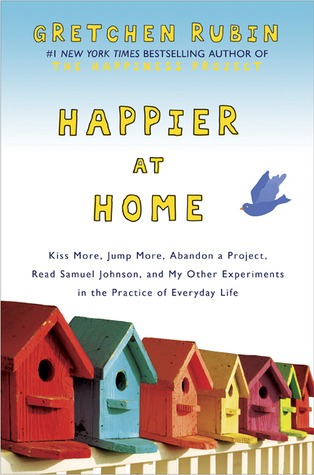Happier at Home Summary

6 min read ⌚
 Kiss More, Jump More, Abandon a Project, Read Samuel Johnson, and My Other Experiments in the Practice of Everyday Life
Kiss More, Jump More, Abandon a Project, Read Samuel Johnson, and My Other Experiments in the Practice of Everyday Life
Do you feel happy? If not, you probably think that you’re pretty far from feeling even an ounce of happiness.
Well, Gretchen Rubin says that you’re wrong. Because all you need is some small changes and no more than nine months to be “Happier at Home.”
Who Should Read “Happier at Home”? And Why?
There are two types of people: those who like adventures, and those who want peace. “Happier at Home” is for the latter: it claims that you don’t really need anything more than a nicely organized home and a loving family to be happy.
By the end of this book, even the adventurers may concur.
About Gretchen Rubin
 Gretchen Rubin is an American author and blogger, usually writing about the three h-s of happiness: human nature, home, and habits. And she writes with a lot of humor.
Gretchen Rubin is an American author and blogger, usually writing about the three h-s of happiness: human nature, home, and habits. And she writes with a lot of humor.
Her books have sold more than 3 million copies, and her personal website – https://gretchenrubin.com/ – has more than 700,000 subscribers and is one of the most popular of its kind.
She is the author of many books, among them “The Four Tendencies,” “The Happiness Project,” and “Better Than Before.”
“Happier at Home Summary”
By now, we’ve featured Gretchen Rubin quite about enough times so that you can remember her as the author of few books whose subtitles are longer than some of Hemingway’s short stories.
This one’s no exception: “Kiss More, Jump More, Abandon a Project, Read Samuel Johnson, and My Other Experiments in the Practice of Everyday Life.”
OK. Now, do I really need to read the book? Or is this everything I need to do so as to be, as its title states, “happier at home”?
Of course you should – and of course it isn’t. But, it gives you a glimpse of what the book is all about. Namely, the small stuff. You know, the stuff which makes life world living.
Because that’s what the happier-at-home project is most interested in. It’s a nine-month program which, by the end of it, should make you feel happy about yourself, your home, and your everyday routines.
But, let’s not get carried away – if your home was as it was supposed to be, you wouldn’t need a nine-month project. So, before starting with it, let’s make a list of what is good and what is bad about it.
In other words, ask yourself four fundamental questions:
1. What makes you feel good when you are at home?
2. What makes you feel bad when you are at home?
3. What do you need to do in order to feel more as in 1 than as in 2?
4. What do you need to do in order to continually grow even though staying at home?
Now that you know where you’re heading, it’s time for the essential spring-cleaning exercise. “A messy room equals a messy mind,” Marie Kondo wrote in “The Life-Changing Magic of Tidying Up.” And Gretchen Rubin did the experiment to find out it is true.
Decluttering your home from the stuff you don’t need will result in freeing your home for the stuff which makes you feel happy and satisfied. And the bonus is – that the same happens in your mind as well.
Now, you’re ready to fill it with the stuff that really matters: your family.
You see, Gandhi’s idea that you need to be the change you want to see in the world matters nowhere as definitely as in your house. You want to have an affectionate and caring partner who will rarely get stressed and nervous? Then – be one yourself. Until you inspire him or her to become one.
Because, you see, in families, people learn from each other. If you give up smoking, there are 67 percent chance that your partner will too. That means about 7 in 10 couples!
Now, if that doesn’t motivate you to become nicer and more thoughtful – nothing will!
Of course, being happy is related by definition to protecting yourself from unhappiness. Which, in other words, means at least three things.
First of all, avoiding unhappy people who drain your energy. Secondly, using different stimuli in the present to bring back past memories to get you up when you are down. And finally, resisting temptations which, turn you into an instant gratification monkey, i.e., someone who sacrifices his future more permanent happiness for a brief moment of satisfaction in the present.
Key Lessons from “Happier at Home”
1. Declutter Your House, Declutter Your Mind
2. Avoid the Unhappiness Leeches
3. Remember the Pareto Principle – and Act Accordingly
Declutter Your House, Declutter Your Mind
Your brain is a mighty organ. So powerful, in fact, that it’s almost impossible to control it. In other words, it notices things at least few hundred milliseconds before you (yes, that’s quite about right). Free will? Nah – it may be just an illusion.
Anyway, if your brain is capable of noticing things all around you and react accordingly, you may help him at least at the place where you spend most of your day, i.e., your home.
Declutter it!
If there are some things which remind you of chaos or unfinished business – throw them away. Get some headspace. And fill your room – and your brain – with the things that matter the most.
Avoid the Unhappiness Leeches
Now, as hard as you try, there’s a high chance that all your effort will go down the drain the very minute you meet a person who seems immune to your cheerfulness and, in fact, tries to infect you with his dark energy.
There are three types of these unhappiness leeches, says Gretchen Rubin. The first kind is the slackers who feign helplessness in order to get your attention. The second ones are the gossipers who have no lives of their own, so they try to make laugh of the ones who do. And the third kind is the grouches, the needy and the pessimistic folks who counter your joy at seeing a rainbow with a “Meh, it’s just a natural phenomenon…”
Do we need to say more?
It’s pointless to spend time with people who make you unhappy.
Just avoid them.
Remember the Pareto Principle – and Act Accordingly
A positive attitude is the right attitude – no matter what the initial stimulus is. So says Dalai Lama. So says Gretchen Rubin as well. Because only 20 percent of your happiness is the result of the things which happen to you. The other 80 are decided by your reactions.
For example, once Rubin’s daughter spilled some nail polish on the floor. Gretchen could have raged all day about it – but that wouldn’t have changed anything. So, she just asked her nicely to quickly research the best ways they can deal with the stain. In the end, Gretchen’s daughter found a solution.
The results?
No stain, no anger, no remorse.
And a newly acquired skill. (Which, by the way, we should learn too).
Like this summary? We’d like to invite you to download our free 12 min app, for more amazing summaries and audiobooks.
“Happier at Home” Quotes
I am living my real life, this is it. Now is now, and if I waited to be happier, waited to have fun, waited to do the things that I know I ought to do, I might never get the chance. Share on X It's so easy to wish that we'd made an effort in the past, so that we'd happily be enjoying the benefit now, but when now is the time when that effort must be made, as it always is, that prospect is much less inviting. Share on X While some more passive forms of leisure, such as watching TV or surfing the Internet, are fun in the short term, over time, they don't offer nearly the same happiness as more challenging activities. Share on X I'm not tempted by things I've decided are off-limits, but once I've started something, I have trouble stopping. If I never do something, it requires no self-control for me; if I do something sometimes, it requires enormous self-control. Share on X As I turned the key and pushed open the front door, as I crossed the threshold, I thought how breathtaking, how fleeting, how precious was my ordinary day Now is now. Here is my treasure. Share on XOur Critical Review
There are few things you can never get enough of. Happiness is certainly on the top of this list. And, consequently, books which help you be happier as well.
“Happier at Home” is one such book. It may not be the best one – but it is both wittily written and applicable. So – you can’t ask much more, can you?








